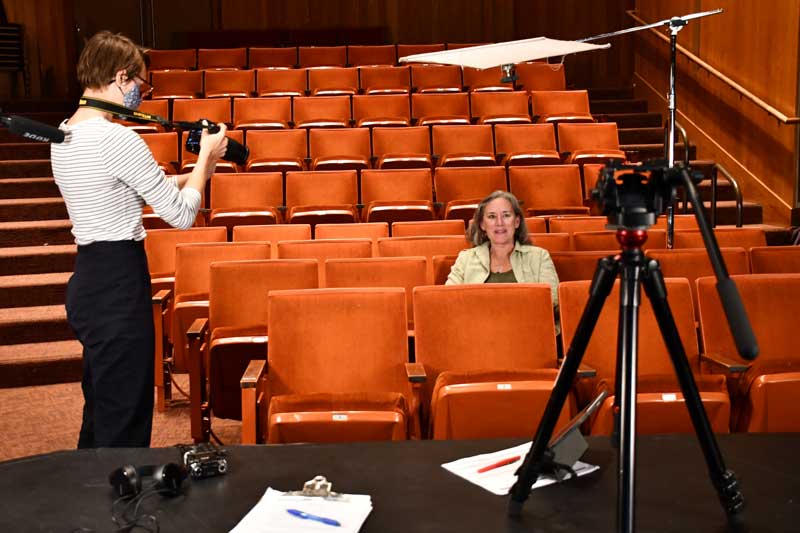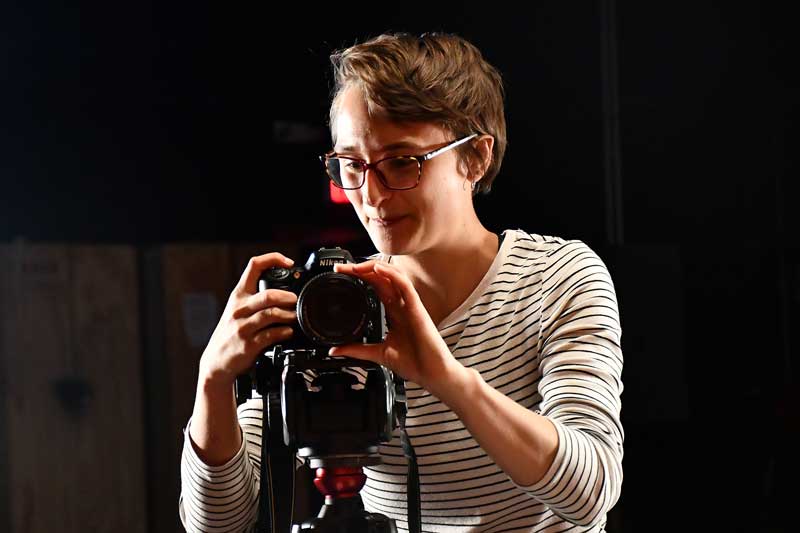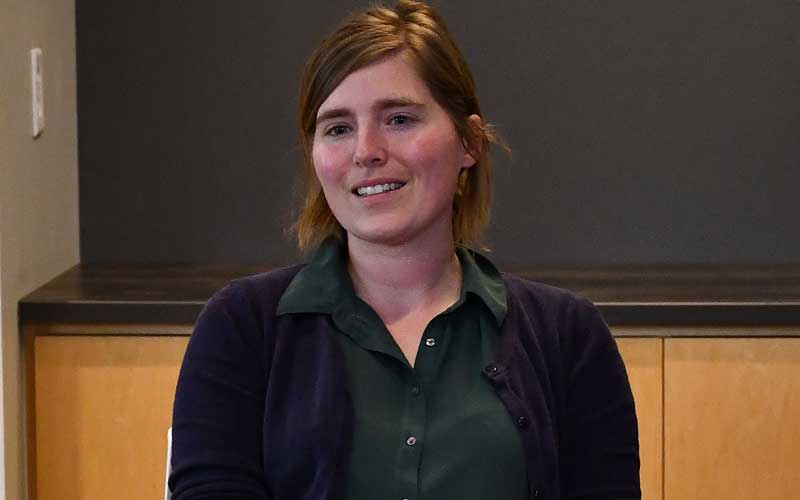Molly O’Connor and Hannah Robb collaborated to produce a documentary about The Remember Project. These are their notes as they worked through the creative process.

March 2020
Molly
I was running a little late to a meeting with someone I had only met over the internet, Linkedin, to be more specific. This person was Danette McCarthy, a current-day Renaissance Woman, consultant, and Creator of The Remember Project. The purpose of this meeting was to pick her brain about the ins-and-outs of consulting. To both of our surprise, Danette and I connected almost immediately. We spent two hours sharing about our professional, and personal lives. When I told her of my filmmaking experience, she told me about a documentary project she needed help with. And, that a student intern would join her team for the summer to assist in creating the film, but she needed someone to help manage and mentor the intern. That is when Danette popped the question, “Molly, are you interested in joining my team?”
Hannah
Come March, and I was still debating what I could yet squeeze into the luggage I’d be hauling through airports as I plane-hopped my way from Minneapolis, MN, to Wiesbaden, Germany. I would be spending five months abroad studying media and film production as an exchange student. That is, that was the plan until COVID-19 became a global concern. A meager nine days were spent settling down in Wiesbaden before tables turned—which they seemed to do overnight—and I was entrenched in emails and concerned calls from those back home, urging me to fly back before borders closed.

Among these emails was a chain between Robin, a University of Wisconsin – River Falls (UWRF) professor and my advisor, and Danette McCarthy, a UWRF alum and theatre artist. They were determined to help me reimagine the upcoming months to get the most out of this unprecedented change of plans. With them in my corner, we quickly changed what may have felt like a semester of learning lost into the chance to apply my discipline and produce something that would be more than your average student film. Here was an opportunity to create a documentary film in a pre-professional collaborative setting that told the story of a project that, like me, believed in the importance of theatre, conversation and community. All of that led up to the first Zoom call, and my introduction to Danette and Molly.
April 2020
Molly
As I sit in an empty Zoom meeting room, waiting to meet Hannah, I check the CDC website for the most up-to-date information about COVID-19. It doesn’t look good. I think back on the several weeks that have passed since our country went into lockdown and wonder how this will impact the making of this documentary. Danette had a deadline for a final draft by late June, and I couldn’t puzzle together how we could make a quality film when we could not be in the same room as the interviewee. This made me think about my soon to be mentee and peer, and how COVID-19 would impact not only her internship but her professional growth as a filmmaker. And that’s when Hannah joined the call.

Hannah
The call proves to be more than a preliminary get-to-know-you between myself, Danette and Molly—though ice breakers were definitely in order seeing as we were meeting face-to-er… well, rather webcam-to-webcam for the first time. What the call really becomes is my first introductory dive into what The Remember Project is and where it is headed.
I close my laptop after waving a virtual goodbye to those on the call. All the pieces of the project on the horizon are floating around in my head. The tasks would all be building up to the 2020-2021 tour. It is clear that the need for a short documentary introducing what the project is, its history, its hopes for future impact, and its necessity among rural and urban communities is now more essential than ever. Seconds after leaving the business meeting, I walk into the kitchen to help my brothers set the table for dinner, knowing Molly and I would be discussing a lot in the upcoming days. Specifically, how we would logistically go about telling this story through the medium of film.
May 2020
Molly
The cameras are ready, the lighting is set and we are ready to begin our first interview. I look over to Hannah, mask on, and camera in hand. We had met in person for the first time only an hour ago, but it felt like we had been making films for years. She looks over and lets me know the cameras are rolling. I take the cue and click the record button on the TASCAM.
I look to our interviewee and say, “now, Danette, let’s begin! Please clap your hands so we can sync the audio and then spell out your name for us.”
Hannah
I am nervous about my first round of interviews. I have little prior experience filming unscripted material, not to mention setting up camera/sound/light gear to conduct an interview that adheres to social distancing regulations. However, Molly has my back. She is an interviewer, cinematographer, and sound operator extraordinaire. While Danette, and all those who cycle through the “hot seat,” are all smiles and share words of encouragement. I don’t know what I expected. Perhaps I should have known that the individuals who backed a project like The Remember Project—one founded on the idea of conducting conversation through artful storytelling—would show the same genuine support for this kind of conversation, this kind of story.
June 2020
Molly
“That’s a wrap!” I say as we finish our last interview with the Metropolitan Area Agency on Aging (MAAA) staff who are involved in the Remember Project. As Hannah and I begin to breakdown our set-up, my mind thinks about all of the passionate, smart, and inspirational people we had interviewed in the last two months. All of whom are firm believers and advocates in The Remember Project. Before making this film, I didn’t realize just how important this project had been for the communities who have used it. From listening to so many inspirational stories, it gave me a deeper understanding of The Remember Project’s impact and why once you’ve been a part of the process, you become a lifelong advocate.
I look over to my far left to see the talented Jim Pounds, the new program manager, packing up his bag. To my right is Julie Roles, MAAA’s communications director, and Danette talking about the future of The Remember Project regarding virtual facilitation. I think about how this project is in such good hands. And, then, of course, there is Hannah who is looking at me and says, “Hey, would you help me with this C-stand?” I quickly return to reality and say, “of course!”
Hannah
I replace my director’s cap for that of an editor’s. As I work through the hours of interview footage, it is hard not to feel intimately bound to The Remember Project. The interviews are full of positive testimonials, personal stories, and thoughtful prose from those who care deeply about their community and inspire one to feel the same. There are just so many excellent sound bites from so many wonderful people. As I pluck away at editing, I am starting to think that this project deserves more than a 10-minute mini-doc—it deserves a feature-length film! However, I shake off this thought and get back to steadily dragging the computer mouse this way and that, piecing together the authentic tidbits of dialogue shared by those who feel most passionate about this cause.
It is my hope that this film has the chance to introduce The Remember Project to many.
Click, save.
Click, export.
Click, share.
About the Contributors
Molly O’Connor (she/her/hers) is an evaluation and communications consultant for her firm, Coco Canary Consulting, LLC. Molly was the project manager for the documentary and assisted in the filmmaking process as well.
Hannah Robb (she/her/hers) will be graduating this fall as a Stage and Screen Arts and Communication Studies double major from the University of Wisconsin-River Falls. Hannah was the director and editor of the documentary and completed The Remember Project film as part of a pre-professional internship with McCarthy & Associates, Inc.
